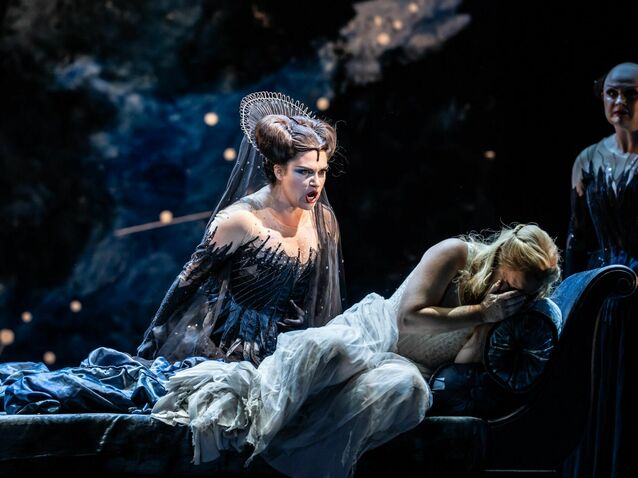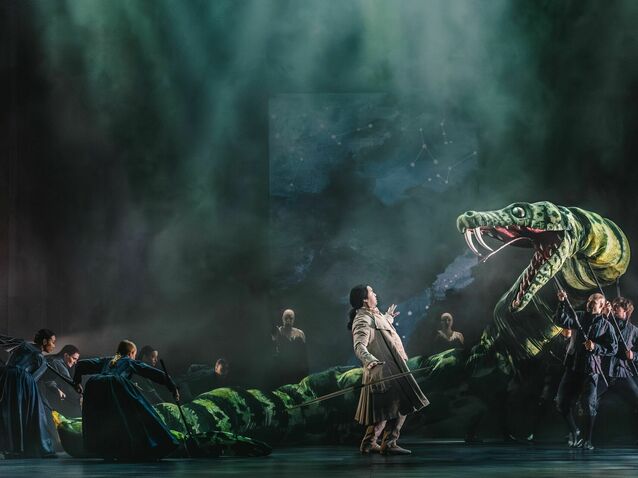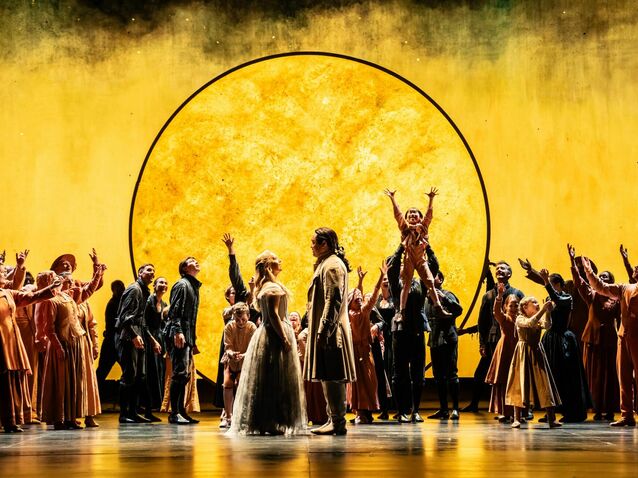 © Johan Persson / Royal Ballet and Opera
© Johan Persson / Royal Ballet and Opera
Wolfgang Amadeus Mozart’s final opera The Magic Flute, which premiered on 30 September 1791 just a few months before his death, takes the form of a Singspiel that combines singing with spoken dialogue. In it, the Queen of the Night persuades Prince Tamino to rescue her daughter Pamina from captivity under the high priest Sarastro, who she claims is evil. As Tamino goes about his quest, however, and falls in love with Pamina, he learns that things are the other way around. The Queen of the Night represents the forces of darkness, while Sarastro’s community stands for high ideals and enlightened values, leading Tamino to seek to join it. As a result, he and Pamina, separately and then together, undergo a series of trials of initiation. These are focused less on revealing brute strength than moral resolve and mental courage, and end in triumph as the Queen and her cohort are vanquished. Some comedy is also introduced in the form of the bird catcher, Papageno, who accompanies Tamino on his quest and fails the trials completely, though he is rewarded anyway with the hand of his ideal female companion Papagena.
Mozart and his librettist, Emanuel Schikaneder, were both Freemasons. This not only explains the work’s Masonic elements and Enlightenment philosophy, but also why it has never been the easiest piece to stage, because bridging the gap between its fun and religious elements, its obvious magic and deeper symbolism, presents quite a challenge. The secret to the longevity of David McVicar’s 2003 production for the Royal Opera, which is revived on this occasion by Ruth Knight, is that it meets it head on. It does so by offering a notably measured staging that allows each of the opera’s disparate elements to breathe uninhibited. It keeps the humorous aspects under control while allowing the emotional and symbolic elements to speak, unimpeded by an overly lavish set-up.
The production certainly has its sillier moments as the curtain rises on a dopey looking serpent, and Papageno’s entrance is accompanied by a bird pushed along on wheels who proceeds to outwit the bird catcher, at least during ‘Der Vogelfänger bin ich ja’ itself. It is far better, however, to pass these props off as ironic in their humour than to risk falling flat on one’s face by trying to make them more serious. Elsewhere, the staging has a pleasing understated quality. The Temple of Wisdom, in which the Speaker appears, finds enough to draw the eye with just a few celestial instruments and figures, while the Queen of the Night appears against a backdrop of constellations in the sky. In fact, at the end of ‘O zittre nicht, mein lieber Sohn’ the simple act of her heading to the back of the stage gives the impression of her dissolving back into her ‘domain’. In John Macfarlane’s set, which is beautifully lit by Paule Constable, the shape of the columns that run down both sides of the stage give the resulting structure an almost post-modern feel. These can be relatively compressed to suggest an overbearing, enclosed space, or opened out to create a far larger area.

Amitai Pati as Tamino in The Magic Flute ©2025 Johan Persson
The staging includes a relatively large group of actors who move between playing humans, animals, puppeteers and props. They operate the serpent at the start and also hand the staging a touch of the Brechtian by making, for example, the frequent introduction and removal of a couch an integral part of the drama. In a similar vein, during ‘O zittre nicht, mein lieber Sohn’ and ‘Der Hölle Rache kocht in meinem Herzen’ the Ladies (Hannah Edmunds, Ellen Pearson and Emma Carrington on good form) are joined by three further veiled figures who help to accentuate the Queen of the Night’s presence by moving or swaying around her.
The actors also give the animals they play during ‘Wie stark ist nicht dein Zauberton’ human traits as warthogs carry walking sticks and birds walk on stilts. All this is in keeping with the fact that the opera premiered not at Vienna’s Burgtheater, but at the librettist Schikaneder’s own Freihaus-Theater auf der Wieden, where by November 1792 it had already notched up a hundred performances. This venue was as famed for its fairytales and comedies as its Goethe, and the original production included sixteen set changes as well as real lions, monkeys and serpents.
There are a few moments that do not come across as strongly, as the journeys through fire and water feel more stagnant they should. There is nothing wrong in seeing the actors writhe and sway to portray them, but because they always remain behind Tamino and Pamina, rather than enveloping them, there is no real sense of danger that needs to be overcome. Nevertheless, this is a staging that overall hits the mark many more times than it misses it.

Lucy Crowe as Pamina and Amitai Pati as Tamino in The Magic Flute ©2025 Johan Persson
If the production provides ample opportunities for fun to be had, the current cast seizes them with both hands. This is especially true of Huw Montague Rendall who gives a very physical performance as Papageno and embellishes the role, which he also played here in 2021, in many different ways. The sheer level of comedy that he introduces works, however, because his performance is still underpinned by real substance. His baritone is warm and smooth, and in his duet ‘Bei Männern welche Liebe fühlen’ with Pamina, one can see genuine sadness in his eyes. In fact, one of the real strengths of this revival is the interaction between Papageno and Lucy Crowe’s Pamina as their glances and gestures establish a real connection and understanding between them. Crowe is a brilliant Pamina, and while her soprano generally feels glistening and radiant, the range of nuances she brings to it is quite staggering. ‘Ach, ich fühl’s’, in particular, is delivered in a highly sensitive fashion that highlights her fragility and state of mind at that moment.
Making his Royal Opera debut as Tamino, Amitai Pati reveals a tenor with a beautiful tone, and imbues the character with just the right levels of innocence and idealism. Soloman Howard is a commanding Sarastro, bringing a strong and relatively bright bass to the role. Kathryn Lewek, who also played the Queen of the Night here in 2023, gives a superb performance of ‘Der Hölle Rache kocht in meinem Herzen’, which is characterised by the cleanness and precision of her coloratura. She also proves a fine actor as in ‘O zittre nicht, mein lieber Sohn’ there is just an element of her seducing Tamino into agreeing to her plan, even as she ostensibly plays the concerned and distraught mother.
Gerhard Siegel is luxury casting as Monostatos as his world class tenor combines with some astutely observed expressions. Matthew Rose asserts his firm bass to tremendous effect as the Speaker of the Temple, and makes the character feel very human by coming across as just a little less upstanding and a little more moody than usual. The three Children are finely sung by Remi Bianchi, Georgina Bamford and Phoenix Matthews (who ‘alternate’ performances with Leo Ogungbemi, Eos Groen and Sophia Cullingford), while Marianna Hovanisyan is a spirited and effective Papagena. There is excellent support from Stuart Jackson and Graeme Broadbent as the Men in Armour, while Harry Nicoll and Wyn Pencarreg are highly entertaining as the Priests who find themselves involuntarily dancing to Papageno’s ‘Ein Mädchen oder Weibchen’. Conductor Marie Jacquot, on her Royal Opera debut, keeps a firm hand on the proceedings, and elicits playing that is equally balanced, dramatic and insightful. A largely different cast, conducted by Finnegan Downie Dear, appears for several of the later performances in the run, although Huw Montague Rendall plays Papageno on every night.
By Sam Smith
The Magic Flute | 10 October - 3 November 2025 | Royal Ballet and Opera, Covent Garden
the 12 of October, 2025 | Print
Comments